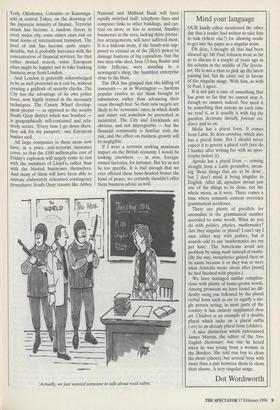Mind your language
OUR kindly editor mentioned the other day that a reader had written to take him to task (where else?) for allowing media to get into the paper as a singular noun.
Oh dear, I thought all that had been cleared up. Mr Paul Johnson went as far as to discuss it a couple of years ago in his column in the middle of The Specta- tor. He is not a man to pick up the latest passing fad, but he came out in favour of the singular usage. With him, as with St Paul, I agree.
It is not just a case of something that has gone so far that we cannot stop it, though we cannot, indeed. Nor need it be something that annoys us each time we read it, as it usually is with beg the question, decimate, literally, forensic evi- dence and so on.
Media has a plural form. It comes from Latin. So does omnibus, which also has a plural form. But I should never expect it to govern a plural verb (nor do I hanker after writing bus with an apos- trophe before it).
Agenda has a plural form — coming straight from a Latin gerundive, mean- ing 'those things that are to be done', but I don't mind it being singular in English. After all, agendum means just one of the things to be done, not the whole menu, as it were. There comes a time where semantic content overrides grammatical accidence.
There are plenty of parallels for anomalies in the grammatical number accorded to some words. What do you do with politics, physics, mathematics? Are they singular or plural? I can't say I care either way with politics, but it sounds odd to say 'mathematics are my pet hate'. The Americans avoid any problem by using math instead of maths. (By the way, metaphysics gained their or its name because it or they was or were what Aristotle wrote about after [meta] he had finished with physics.) We have managed similar complica- tions with plenty of home-grown words.
Among pronouns we have found no dif- ficulty using you followed by the plural verbal form such as are to signify a sin- gle person acting; in most parts of the country it has entirely supplanted thou art. Children is an example of a double plural which tacks on a plural suffix (-en) to an already plural form (childer).
A nice distinction which entertained James Murray, the editor of the New English Dictionary, was one he heard when he was young from a woman in the Borders. She told one boy to clean his shoen (shoes), but several boys with more than a pair between them to clean their shoens. A very singular usage.
Dot Wordsworth


























































 Previous page
Previous page